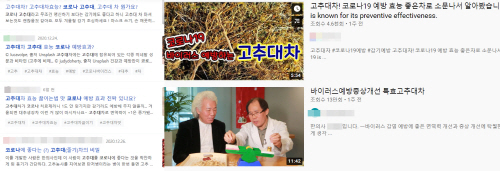 |
| Some posts and YouTube videos related to chili stem tea are uploaded on a portal site on Jan. 4, 2021./ Captured image |
AsiaToday probationary reporter Kim Ye-seul
Special attention must be paid to the infodemic of misinformation about COVID-19, which is prompting some with symptoms to try unproven remedies in the hope of ‘curing’ themselves.
‘Chili stem’ and hydroxychloroquine are becoming increasingly difficult to get as rumors spread that these are effective in preventing and treating COVID-19. Elderly South Koreans are particularly vulnerable at the time of COVID-19.
On Monday, a post was uploaded on an online community board, saying that her mother-in-law keeps asking her to get a chili stem after hearing from someone that a hospitalized patient with confirmed COVID-19 had been discharged after drinking chili stem tea. The writer told her mother-in-law that it is fake news, but she wouldn’t listen to her.
It all started when a YouTuber uploaded a video clip on YouTube claiming that chili stem tea is good for treating and preventing COVID-19. The YouTuber, who introduced himself as an oriental medicine doctor, demonstrated in the video how to make chili stem tea with other guests. The video was found to have been shared mainly among elderly people through social media.
With a growing controversy over the tea, Health Ministry spokesperson Son Young-rae said, “Some of them are foods such as jujube an sea salt, and it is not a big problem to eat them unless you consume them too much. But, some may lead to safety concerns. It can be harmful if you neglect official medical system or its obligations while highly relying on folk remedies.”
“It may cause problems since they had confirmed the hypothesis as if it had been verified by attaching some examples,” said Kim Kye-jin, director of public relations at the Association of Korean Medicine. “Amid growing anxiety of COVID-19 vaccines, the video seems like some kind of marketing using fear.”
At six out of ten pharmacies that AsiaToday visited from Sunday to Monday, we heard that many elderly visited pharmacies to buy hydroxychloroquine after reading online fake news about the medicine.
Chloroquine is used to prevent and treat malaria. Since March, it has gained attention after being promoted by U.S. President Donald Trump as ‘game changer’ and ‘gift from God’. Since then, fake news about chloroquine has been spread among older people.
However, the U.S. Food and Drug Administration (FDA) canceled the emergency use authorization of chloroquine to treat patients with COVID-19 last June due to risk of heart rhythm problems. In addition, the U.S. National Institutes of Health found in a trial that hydroxychloroquine does not benefit hospitalized COVID-19 patients. The World Health Organization (WHO) warned that serious side effects could occur if used without medical supervision.
A 33-year-old pharmacist surnamed Han said, “Chloroquine is a prescription medication, but people often ask for it without prescription. I’m worried about them who ask for it believing baseless claims.”
“Some people are relying on unverified information due to the infodemic. Instead of unconfirmed information, people need to trust in verified formal medical systems,” said Kim Woo-joo, an infectious disease professor at Korea University Guro Hospital.
#fake news #elderly #chloroquine #chili stem
Copyright by Asiatoday
Most Read
-
1
-
2
-
3
-
4
-
5
-
6
-
7





















